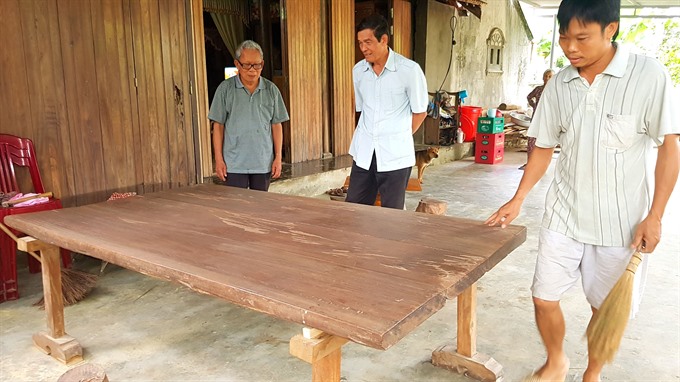 Life & Style
Life & Style

A wooden plank believed to have been used as a bed by King Hàm Nghi (1884-1885) has been found in the central province of Quảng Bình.
 |
| King size: The bed believed to have been used by King Hàm Nghi when he called for the people’s supports to fight the French in the central province of Quảng Bình. — Photo sggp.org.vn |
HÀ NỘI — A wooden board believed to have been used as a bed by King Hàm Nghi (1884-1885) has been found in the central province of Quảng Bình.
Đinh Xuân Định, chairman of Minh Hóa District’s Heritage Association, confirmed that the board had been stored at the home of Đinh Hữu Hạnh, a primary teacher.
King Hàm Nghi, real name Nguyễn Phúc Ưng Lịch, was the eighth king of Nguyễn Dynasty.
“Hạnh is the fourth generation to hold on to the rare board used by King Hàm Nghi,” said Đinh Văn Niêm, 83, a member of the association. “Hạnh’s ancestor, Đinh Văn Hiện, who was head of the region under the king’s reign, had the bed made from three separate wooden planks.”
“When King Hàm Nghi left Huế’s Imperial Citadel to start the Cần Vương patriotic movement against the French in Quảng Bình, he used the board as a bed to sleep on and to discuss issues with other patriots.”
After King Hàm Nghi was captured by the French and the movement failed, the plank was handed down through the generations of Hiện’s family.
“The board was carefully stored by my father and grandfather in the most important room in their house,” Hạnh said. “During the American War, the board was used as the cover for a bomb shelter.”
Hạnh has then kept the plank in his house and protected from many serious floods.
Định has spared no efforts to persuade Hạnh’s family to donate the precious object to exhibit as a local heritage.
King Hàm Nghi was enthroned at 13 years old by royal mandarins Nguyễn Văn Tường and Tôn Thất Thuyết. After the fight against the French failed in 1885, Tôn Thất Thuyết helped the king call for the support of the whole people to fight against the French.
The movement lasted until 1888 before King Hàm Nghi was captured and exiled to Algeria, where he died in 1943 due to stomach cancer. — VNS




